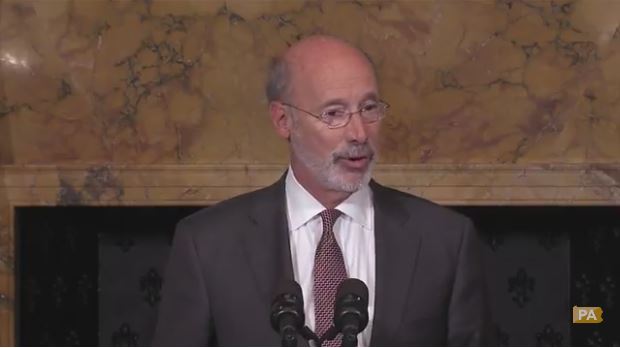Pennsylvania Governor Tom Wolf encouraged the General Assembly to pass a set of pending legislation to combat the opioid epidemic.
Earlier this month, the governor signed an executive order declaring heroin and opioid epidemic a statewide disaster emergency. Pennsylvania is among the states with the highest rate of drug overdose deaths, primarily caused by prescription and illicit opioids. At least seven Pennsylvanians die every day from drug overdoses.
On Monday, Gov. Wolf said, “I encourage the legislature to make passage of these bills a priority.” The governor also thanked the General Assembly for passing several pieces of legislation recently. One the recently passed bill allows the Department of Drug and Alcohol Programs to regulate recovery houses that receive taxpayers’ money.

In addition, the governor also expressed gratitude to those lawmakers who took the initiative to draft legislation to further his initiatives to address the opioid epidemic.
“I commend them for sharing my commitment to help even more Pennsylvanians fight the disease of addiction and look forward to continuing our work together to combat this crisis,” said Gov. Wolf.
Pending legislation to further Pennsylvania’s initiatives against drug addiction
There are four pending legislation to expand the governor’s key initiatives to eliminate the heroine and opioid epidemic, which is tearing apart families and communities. These bills include the following:
- Senate Bill 472 is a priority bill that limits prescriptions for controlled substance containing an opioid. The limitation is seven days unless there is a medical emergency that puts the patient’s health or safety at risk. In addition, this legislation also require all prescribers who are licensed, registered, or lawfully authorized to distribute, dispense, or administer a controlled substance containing an opioid to discuss the risks of addiction and dangers of overdose associated with the medication. Republican State Sen. Gene Yaw is the author of the legislation.
- Senate Bill 391 is an amendment to the Mental Health Procedures Act (MHPA). This legislation will allow families to seek court-ordered treatment for their loved ones suffering from substance abuse.
Pennsylvania State Senate Democratic Leader Jay Costa is the sponsor of Senate Bill 39. He believes that it is “imperative” to empower families to help their loved ones to get treatment for drug addiction.
- Senate Bill 978 allows home health and hospice staff to properly dispose unused prescription medications after a patient’s death. Under the current DEA rule, non-family cannot dispose those medications unless authorized by the state. The unused medications become part of the patient’s estate, therefore opening the door to misuse.
Republican State Senator is the author of Senate Bill 978. In a previous statement, she emphasized that the current DEA rule “makes no sense.” According to her, “These are controlled substances. We need to leave their disposal to the medical professionals, and let families attend to the details of their bereavement.”
- House Bill 353 requires the prescriptions of controlled substances (Schedule II, III, and IV) to be completed electronically. The objective of the legislation is to reduce tampering or forgery. Republican Cong. Ted Nesbit is the author of the bill.






